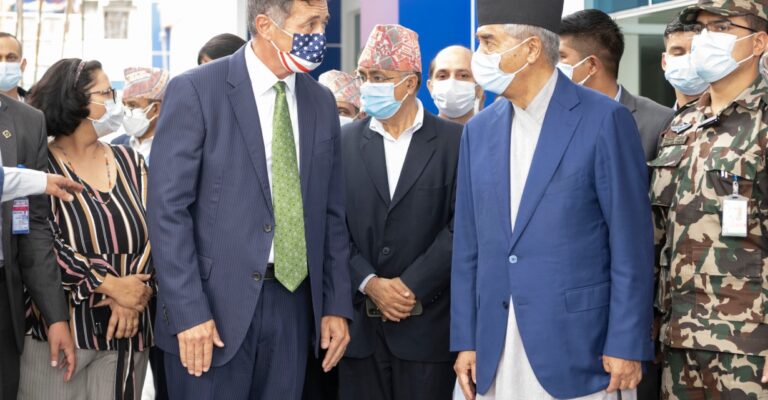
After much pressure from the public as well as political sphere, the government has sent a letter to India objecting to the disappearance of Jay Singh Dhami falling into the Mahakali River and Indian helicopters flying in the Nepali sky in the recent days.
Dhami had fallen into Mahakali on August 15 as he was crossing the river via tuin (an improvised ropeway) after security personnel of the Shasatra Seema Bal (SSB) cut the tuin’s cable from across the river.
Nepal government on Monday sent a diplomatic note to India through the Indian Embassy in Katmandu stating India’s deliberate involvement in both the incidents.
Though such letters were earlier sent directly to the Indian Ministry of External Affairs through the Nepali Embassy in Delhi, this time it was sent to the Indian Embassy.
The letter reportedly states that SSB is responsible for the tuin incident, the security personnel involved should be brought to book and appropriate relief as well as compensation be provided to Dhami’s family.
Similarly, the government said that its serious attention had been drawn to the fact that Indian helicopters had flown in Nepali sky without permission. The government has asked India to prevent such activities from being repeated in the coming days.
Issues existing between Nepal and India, including border problems, damage caused by floods, inundation, trade and transit problems, remain perennially unaddressed as no concrete plan of action has ever been worked out by any government.
Meanwhile, the US Embassy in Nepal has stated that the western country was a supporter of free speech and fact-based public discourse regarding the Millennium Challenge Corporation (MCC) compact.
In a tweet on Monday, the embassy said democracy was a “fundamental element” for anyone to express their views peacefully. “We are a strong supporter of free speech & public discourse based in fact, including on MCC. The right to peacefully express one’s views is intrinsic to democracy. The US has been a partner of Nepal and its people for decades & will always support its long-term prosperity,” the embassy said.
The embassy’s remarks came at a time when the Ministry of Home Affairs is facing public wrath for its statements that called on citizens to refrain from commenting on various issues pertaining to foreign policy, including MCC and especially regarding neighboring countries.
MCC is currently awaiting ratification with or without amendment from the Parliament as the text of the agreement says that its provisions will prevail over Nepal’s existing laws in case of conflicts, which requires parliamentary ratification as per the Nepal Treaty Act.
MCC — which the US side has said is part of its Indo-Pacific Strategy (IPS) and which will be against Nepal’s policy of non-alignment — has become a rather controversial and divisive subject in Nepal.
While Prime Minister Deuba is in favor of passing MCC through the Parliament session slated on Wednesday, other parties in the ruling coalition are of the view that it should not be passed without amendment.
CPN-UML, the primary opposition party led by KP Sharma Oli, is in favor of MCC’s approval and has demanded government’s views on the same.
Political parties, including Pushpa Kamal Dahal-led CPN-Maoist Center and Madhav Kumar Nepal-led CPN-US, oppose MCC’s implementation sans amendment and are of the view that endorsing the agreement will align Nepal with IPS, which they say is a military alliance aimed at containing China.
UNDERSTANDING MCC
The agreement for MCC grant was signed between Nepal government and MCC on September 14, 2017.
After several years of preparation Nepal and MCC signed the Nepal Compact agreement on 14 September 2017. The agreement was signed by the then Minister of Finance Gyanendra Bahadur Karki and MCC’s Acting CEO Jonathan Nash at the US State Department in Washington, DC.
The two projects – electricity transmission and road maintenance – are priorities identified through extensive consultation with members of Nepali civil society, private sector and numerous other stakeholders.
Nepal had to qualify and compete with other countries to be eligible and eventually selected for the MCC Compact after successfully meeting MCC’s conditions on good governance, economic freedom, and investing in citizens, and the associated indicators.
The Compact carries a grant of $500 million from US government while Nepal would put in $130 million for the projects to be built under MCC. This is the largest grant Nepal has ever received.
Though Finance Minister Yubaraj Khatiwada registered the compact at the federal parliament for ratification in July 2019, it was never presented before the House for approval.
Though the MCC compact doesn’t say it needs to be ratified by Nepal’s parliament, the text of the agreement says that provisions in the compact will prevail over Nepal’s existing laws in case of conflicts, which requires parliamentary ratification as per the Nepal Treaty Act.
PROJECTED DEFORESTATION
According to the EIA, out of the 777.5 hectare forest area to be used by the 313.9 km long 400 kV transmission line and substation project, trees have to be cut down from 354.4 hectare area.
As many as 78,642 trees have to be felled from 330.4 hectare area of 112 community forests, 1,194 trees from 4.4 hectare area of eight confessional forests and 122,182 trees from 442.7 hectare government protected forest.
According to the EIA, 47,908 trees have to be cut down from the forests of Nuwakot; 45,115 from Tanahu; 35,915 from Makwanpur; 29,561 from Dhading and 17,989 from West Nawalparasi.
Similarly, 12,548 trees have to be cut down in Palpa; 6,035 in East Nawarparasi; 3,696 in Sindhupalchowk; 2,173 in Chitwan and 1,378 in Kathmandu.
The EIA mentions that 2,020,180 trees will be planted in affected districts with the coordination of respective district forest offices to compensate for the deforestation.






